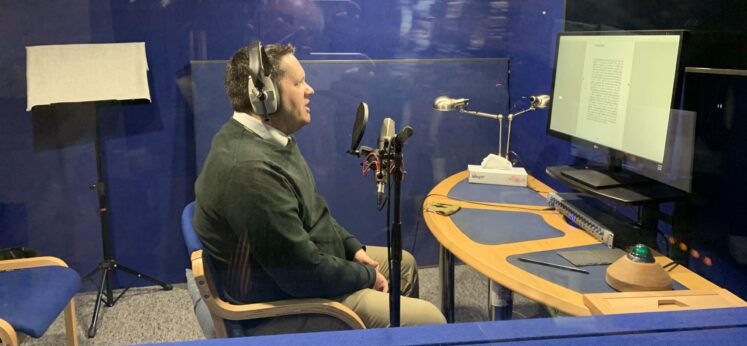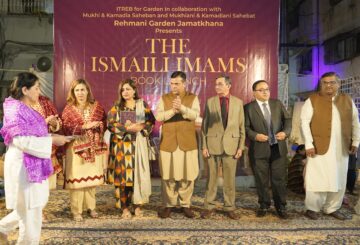Audiobooks have seen a steady rise in popularity over the past few years and this trend has only intensified since the advent of the Covid-19 pandemic and lockdowns. Not only are they convenient (available at the press of a button and accessible while doing other activities like cooking or exercising), but the experience of being read to can be a balm, especially in turbulent times.
To provide comfort and engagement, though, the reading has to be right. Russell Harris, Audiobook Production Manager for The Prophet Muhammad: Islam and the Divine Message, reports from the recording studio on how the team brought the latest title in the World of Islam series to life.
Once more I have had the privilege of overseeing the production of an audiobook in the World of Islam series. This time it was for The Prophet Muhammad: Islam and the Divine Message, authored by our colleague Dr Stephen Burge from the Qur’anic Studies Unit of the IIS. From my experience as production manager for the two previous audiobooks in the series, I had ideas about how we could make this the most compelling listen yet.
The recording process itself took place in a small commercial studio in Fitzrovia, London, over three intense days in November 2020, when we seized the opportunity of a slight relaxation in the lockdown at the time. Stephen was ushered into the studio, plied with water, headphoned and positioned in his chair by the studio technician at a specific distance from the huge microphone. I would then set him reading aloud by quoting to him the first words of surat al-ʿAlaq: “Recite in the name of your Lord”!
There are a few intrinsic issues with an audiobook, particularly since the texts that the IIS has produced contain many Arabic terms and names. The reader must be able to pronounce these both reasonably authentically and in a manner comprehensible to a non-Muslim or non-Arabic speaker. Then we have issues regarding the text, making sure that the stress is always on the correct syllable, that the reader does not drop his or her Ts, uses non-rhotic pronunciation, differentiates between “the” before a vowel or a consonant, and pronounces the indefinite article, “a”, as a schwa and not as “ay”. And to top it all off, the reading, intonation and cadence of the sentences must sound natural!
Pronunciation matters agreed upon, the reader also needs to communicate a certain amount of connectedness to the text, and this was what I felt we could improve upon, especially for a book dealing with the Prophet. How does one convince an actor or voice-over artist that he or she must be “in love” with the text?
In my personal experience as a budding opera singer many decades ago, I realised that the first essay at singing an aria is never any more than a pedestrian reproduction of the composer’s idea. In the opera world people say that you must “work a piece of music into your body”, i.e. you need to practise it as many times as necessary until its performance feels natural.
Fortunately, after carrying out a few sound tests with Stephen, Raeesah Akhtar (the book’s editor), Tara Woolnough (our series manager), and I, we all decided that not only was Stephen’s reading very accurate, mellifluous and fluent, but the drama of his narration was also convincing. In short, we felt that he was providing all the elements needed for a good recording.
I also believe that, possibly as a result of Stephen’s experience of public speaking as a priest in the Anglican Church, the recording sounds like someone speaking from the heart. Once I discovered that Stephen was capable of delivering Qur’anic quotations and hadith in his vox maiestatis (or “magisterial voice”), I encouraged him to use this style of delivery on various occasions throughout the book.
Before recording a text, a further process must be carried out. Generally academic, or “serious”, books are written to be taken in by the eyes, and not read aloud. This means that authors can write things which are a little difficult to understand when read out verbatim. For example, the quotation By the morning light (Qur’an(also Koran. Arabic term meaning, ‘recitation’ or ‘scripture’): Muslims believe that the Holy Qur’an contains divine revelations to the Prophet Muhammed received in Mecca and Medina over a period of… More, 93:1). We have no problem reading this silently, but for recording I rephrased this as: As sura 93, verse 1, states: By the morning light. The intention in making these tweaks is to provide the listener with the most uncluttered listening experience and to remove any potential moments of aural confusion.
It is a credit to Stephen’s patience that not once after my many interventions on these issues, did his voice betray even a hint of irritation. This made the recording process infinitely more enjoyable and fruitful, and I believe that the final product does justice to Stephen’s narrative.
Once we received the edited sound files from the studio, Tara, Raeesah and I all set about the process of listening through the whole book to check that no lines had fallen out in the editing, that there were no audible underground rumblings picked up by the microphone, or strange clicks that those pesky little gremlins can introduce everywhere. Happily, we found none of these. The book is now available to listen to on Audible and readers can hear an audio sample of Stephen’s beautiful reading on our own website as well.







